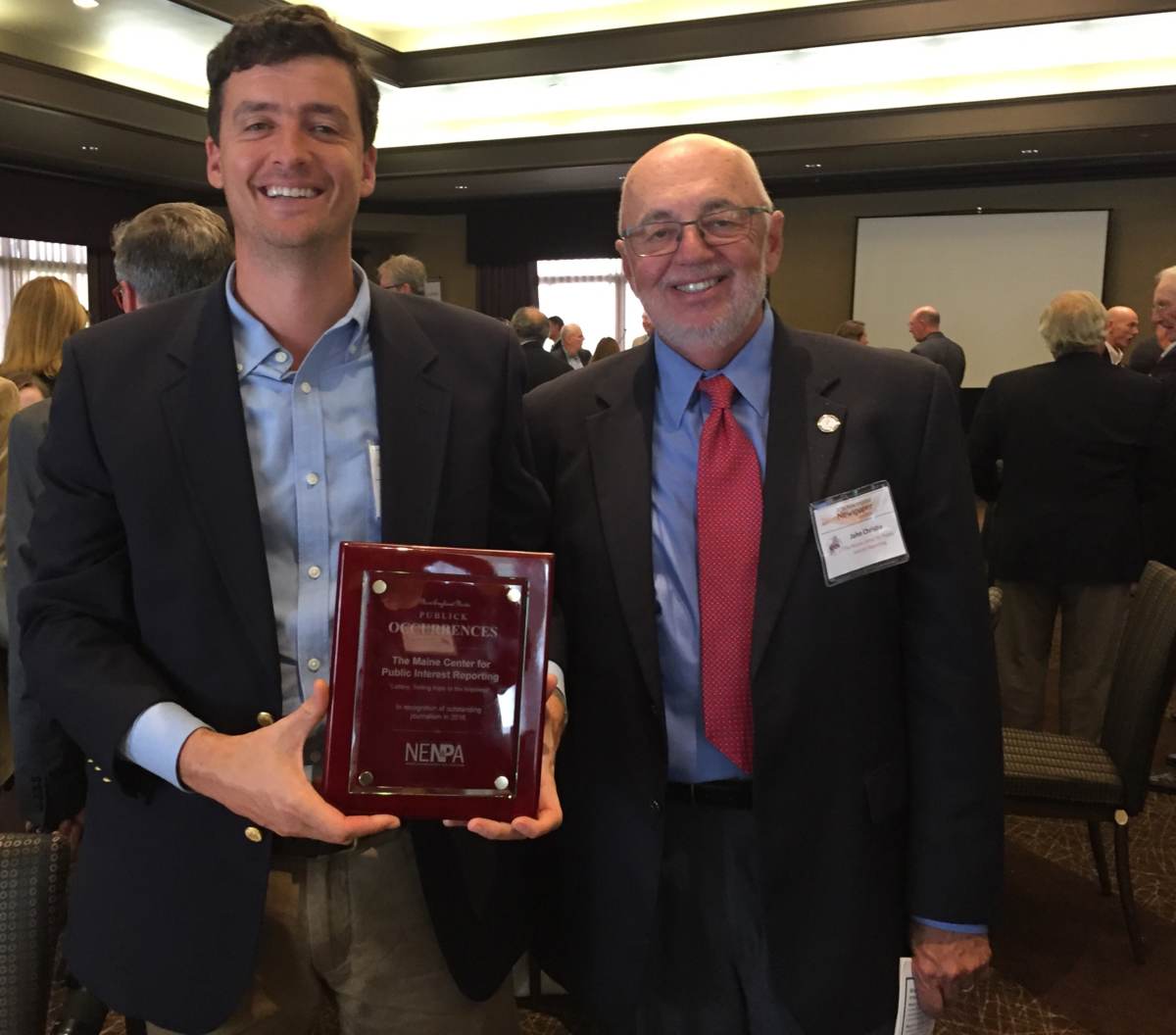The Maine Center for Public Interest Reporting has won a 2016 “Publick Occurrences Award” — that’s not a typo, we promise — from the New England Newspaper & Press Association for Dave Sherwood’s three-part series, “Lottery: Selling hope to the hopeless.”
Sherwood and senior editor John Christie accepted the award at a ceremony Oct. 6 in Natick, Massachusetts.
“I’m honored by this recognition,” said Sherwood, “but as a journalist, I’m most excited by the reaction we received from readers on all sides of this issue. Editorials, opinion columns, letters to the editor, even a newspaper cartoon — it really shows the essential role investigative journalists play in catalyzing conversations about important issues.”
Judges wrote, “This brilliant series takes ordinary statistics a step further in disclosing how state-sponsored lotteries target the poor. Especially telling are the disclosures that Maine lottery revenues increase exponentially with rises in the jobless rate and that lottery players in the state’s poorest towns spend up to 200 times more per person on lottery tickets as those living in wealthier areas.”
In the 43 years Maine had operated a lottery, no one had ever asked who spends the most on it, how it affects the state’s residents, how it is marketed or questioned if running a lottery is a proper role for government. Meanwhile, Mainers are annually spending $230 million on lottery tickets and adding $50 million in “profits” to the state treasury.
The Maine Center for Public Interest Reporting and Sherwood set out to get answers to those questions — and, as much as possible, answers that were based on research, rather than the usual “he said-she said” reporting. To do that, the Center worked with a behavioral economist at Cornell University to do original research on the Maine lottery, focusing on spending patterns and census data.
Sherwood used the research results to tell the full story of the Maine lottery, interviewing lottery buyers, other experts, lawmakers, the governor and examining the lottery’s marketing.
The Cornell research and Sherwood’s reporting revealed that the state lottery was essentially a stealth tax on the poor. For example, people in Maine’s poorest town spent 200 times more per person on lottery tickets than those in wealthier areas. Also, for every one percent increase in unemployment in a given town, there is a 10 percent increase in lottery sales.
Part 2 of the series revealed that when the lottery began, flinty Mainers were not buying tickets at the rate the state had hoped. Rather than accept that its citizens knew best how to spend their hard-earned money, the state set out to persuade Mainers – through increasingly sophisticated marketing – to spend more and more of their income on this state-sponsored gambling.
Part 3 exposed that the agency that runs the state lottery receives almost no scrutiny from the legislature.
“They basically run their own business,” state Rep. Louis Luchini, the chair of the legislative committee that is supposed to oversee the lottery, told Sherwood. “From an oversight perspective, they’re authorized to more or less do what they want.”
“The state is drunk on the revenue,” said former state legislator Peter Mills, who criticized the lottery for selling hope to the poor and then profiting from it. “The political backdrop is, no one cares about these people. They have no constituency. The fact that this money should be spent on groceries for their children doesn’t seem to matter.”
Lawmakers reacted strongly to the series. Legislators from both parties called for closer examination of how the lottery is run. Rep. Luchini said “All the legislators I’ve spoken to said if we are directing advertising towards poor communities in Maine, then there would be a big problem, and it’s something we would have to fix this session.”
Gov. Paul LePage said the state lottery “absolutely” targets the state’s poor and if the legislature passed a bill to end the lottery, he would sign it immediately.
That bill was never submitted, but because of the Center’s series the legislature’s oversight committee ordered that an investigation of the lottery by the state Office of Program Evaluation and Government Accountability be fast-tracked.
On May 2, 2016, prompted in part by the series, the legislature passed, and the governor signed, a bill that bars the use of welfare benefits to purchase lottery tickets, tobacco products and liquor.
The New England Newspaper & Press Association presented 12 Publick Occurrences Awards this year for “the very best work that New England newspapers produce … whether it’s individual or team stories, series, spot news coverage, columns or photojournalism … “The award was established in 1990 to recognize individual and team merit at New England newspapers to mark the 300th anniversary of the founding of Publick Occurrences, the first newspaper published in America. Four days after it appeared in Boston in 1690, Publick Occurrences was suppressed by the royal governor.”
Newspapers of all sizes, from large dailies in urban areas to weeklies in rural towns to small online media such as the Center, competed for the awards.
This is the fourth Publick Occurrences award won by Center reporters since 2014, when the Center was first allowed to participate in the competition and won two awards, more than any other competitor.
“We’ve had a tremendous response to Dave’s lottery series from readers, other journalists and now these judges,” said Center executive editor Joshua F. Moore. “It’s set a very high bar, and one that we will be aiming for with the stories we plan to publish later this month and in the rest of 2016.
“The ceremony was even more sweet,” added Moore, “because we were able to share the winner’s circle with two Center media partners. Our congratulations go out to our colleagues at the Lewiston Sun Journal for their Publick Occurrences and Newspaper of the Year awards, and to the Ellsworth American, which was honored with a Newspaper of the Year award.”







